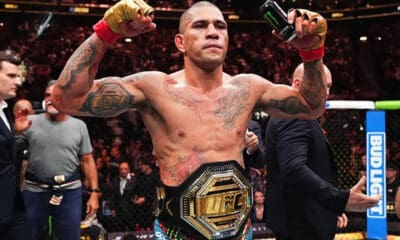Big time boxing in NY is fairly flourishing, with Barclays Center being a constant platform for A grade main events, such as the one being featured on July 29, pitting Adrien Broner against Mikey Garcia, in a 140 pound showdown, with that action being screened on Showtime.
July 15, fight fans can head to Long Island and watch a solid show put together by, again, PBC and Lou Dibella.
Madison Square Garden has been pretty busy of late, with Gennady Golovkin and then Terence Crawford showcasing their skills in the Mecca.
Club shows, not so much. New regulations kicked in last year which have put a chill on activity. Joe DeGuardia is still trying to do fights on Long Island, and Lou Dibella (click link to hear him on EVERLAST “TALKBOX”) did one in Brooklyn, but said it wouldn’t be a regular thing.
On frustrating element is that fans and even those involved inside the game, from a promotional standpoint, and the fighters, don’t hear from the people making decisions which affect them. The New York State Athletic Commission has in recent years been a pretty quiet entity. The authority isn’t encouraged, to say the least, to speak to the press. And so, their side of things isn’t put forth into the news-sphere very often. I reached out recently and asked a commission spokesman to get some questions furnished to acting NYSAC boss Ndidi Massay, and answered. I received answers, from Tony Giardina, the Interim Executive Director.
Here are the results:
Q) Can you tell us the state of the sport, in the perception of the commission? We hear negative stories (see below), are there elements of positivity fight fans should be aware of?
https://www.ringtv.com/493105-keystone-cops-new-york-state-athletic-commission/
Please feel free to offer countering information and the other side of the argument, if that exists.
A) As we have seen over the last couple of months, New York is still home to world-class boxing events, and a destination for the globe’s best fighters. Thus far in 2017, New York has hosted eight at or near capacity boxing cards with more scheduled for the summer and fall.
Our staff are a dedicated and capable group of individuals who, as a team, have adapted seamlessly to regulating both boxing and MMA. As with any new rules, there are always lessons to be learned, changes to be made and room for growth. NYSAC continues to conduct debriefings after each event to determine what went right, what went wrong, and what we can do to improve. Every detail is important to us. We carefully consider any issue raised in connection with a past event, and examine ways to achieve optimal performance for the athletes, the fans, the regulated parties, and the people of the State of New York going forward.
The Commission has been hard at work to make sure all boxing events are properly regulated and that the combatant’s health and safety remain a priority, and ultimately, believe this to be what the Commission will be judged on, as well as keep the integrity of the sport.
Q) Also, big events are occurring with good frequency. Small events, not so. Fighters are losing opportunities to fight on smaller shows. What if anything is being done do remove the hurdles that promoters say makes holding regular club level shows financially prohibitive?
A) In 2016, State legislation was enacted to provide enhanced insurance protections for combatants in Athletic Commission sanctioned events. The medical-accident insurance requirement was increased from $10,000 to $50,000 per fighter, the same amount that is required by the states of California and Nevada. In addition, a new $1 million life-threatening traumatic brain injury (TBI) insurance requirement was added to ensure adequate coverage exists in the event a fighter suffers a life-threatening TBI at an event. The Commission’s focus on fighter safety and injury prevention will yield the kind of claims experience that ultimately results in reduced premiums. As premiums go down, the number of events will rise and result in further competition in the insurance market resulting in even lower premium costs. We remain in regular contact with the Department of Financial Services and insurance providers, and will continually work to attract affordable insurance products to this market.
Q) What positive moves has the commission made in the last few months?
The Commission has taken a number of recent regulatory actions to ensure that the safety, well-being and health of its licensed combatants comes first and foremost. In preparation for MMA’s debut and also relative to boxing, the Commission created a Medical Emergency Action Plan (MEAP) to ensure that the Commission and its employees, and other stakeholders, effectively mitigate and respond to medical emergencies at professional combative sports events that are overseen by the Commission. The plan outlines the responsibilities and duties of the Athletic Commission and its employees, and informs and empowers them to act quickly and knowledgeably in the event of a serious and or, potentially, life-threatening injury to a combatant. It also informs NYSAC licensees – officials, promoters, combatants, managers – and other key stakeholders of the Commission’s protocols to be followed before, during, and after a medical emergency. The MEAP will be regularly updated and made available to all staff and stakeholders. NYSAC staff is trained regularly as to the protocols included in the plan. The Commission also added a new permanent position of Assistant Chief Medical Officer, which is a full-time physician on staff, to compliment the Chief Medical Officer and panel of ringside physicians in ensuring the health and safety of athletes is kept at the forefront of the Commission’s regulatory mission. In addition, the Commission worked in partnership with the Office of the Inspector General to ensure that all of its staff, commissioners and inspectors received training on public integrity and ethics rules.















